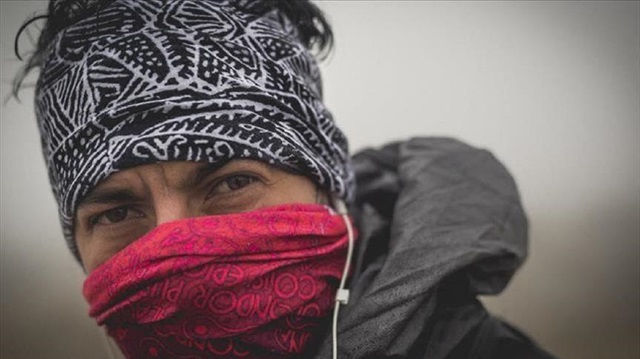
Millan Ludena in Guinness World Records by running in the world’s deepest goldmine
Millan Ludena has become the first person ever to run a half-marathon 4,000 meters (2.5 miles) underground.
The Mponeng goldmine just outside Johannesburg served as the track. It is considered the deepest mine in the world.
To make it to the finish line, Ludena had to struggle against the elements underground -- 40 degrees Celsius (104 F) temperatures felt deep underground, a relative humidity of 80 percent and atmospheric pressure of 1.4, which is similar to what a diver feels five meters below sea level.
“The place has limited visibility and oxygen. It´s hell”, the Ecuadorian runner told Anadolu Agency.
Ludena found Mponeng thanks to his girlfriend, Carolina Bassagnana, who is also his adventure partner. She researched locales until she found the South African mine, a colossal monument to gold mining where 5,400 tons of rock are extracted daily.
The company that operates the mine, AngloGold Ashanti, sent the couple a certificate that certified Mponeng is the deepest mine in the world, and last month allowed Ludena to face the challenge of running 21 kilometers (13 miles) underground.
The track was designed in a space of 1 kilometer, which Ludena ran 21 times in two hours, 32 minutes.
A representative from Guinness World Records traveled to South Africa to document the race from a control booth at the surface.
“Once we went back to the surface we received the title,” said a smiling Ludena.
Training was split between physical and psychological preparation, carried out by a team that accompanied Ludena to South Africa.
The strenuous conditioning included running inside a room similar to a sauna where temperatures soared above 40 degrees Celsius.
On his first attempt during training, Ludena fainted after just 15 minutes and his trainers had to put him into a bathtub to help him regain consciousness.
“It was such a big shock to my body and nervous system that I just collapsed”, he said.
Ludena noted he had to get used to the heat and humidity a little at a time until he managed to be able to run for 30 minutes while his pulse was monitored.
Simulating training conditions similar to those at the mine was necessary in order to adapt his body to the climate he would run in and figure out the correct hydration requirements.
Ludena’s biggest worry going into the race was a possible heart attack, he said. “Without the right hydration plan, I was at risk of suffering various cramps. If that happened I could suffer a heart attack since the heart does not know where to pump blood when it has to recover various muscles.”
The idea to run at Mponeng was borne out of a documentary film project that proposed not only the half marathon in South Africa but also another 21-kilometer race at the closest point to the sun, located at the Chimborazo volcano in Ecuador.
The Levector production company was interested in Ludena’s initiative.
Producers had been following his participation in the Antarctic 100 kilometer Ice Maraton in January 2016, and in the 240 km Des Sables Marathon in the Sahara Desert in Morocco in 2014.
Levector, under the direction of Uruguayan filmmaker Oliver Garlant, made From the Center of Earth to the Land of Sun and filmed the history of the Ecuadorian runner who tried to run in the most extreme places around the globe.
In Chimborazo, Ludena mapped out a 15-kilometer route in the mountain’s slopes, another 4,800 meters up to find a shelter and a final climb of 1,480 meters -- a nine-hour trek to the crown of the summit at 6,280 meters that completed the half-marathon.
Being immortalized on film for his endurance prowess is not lost on Ludena who said making it into the Guinness World Records book was not his principal motivation but it was the challenge of running in locations closest to the center of the Earth and the sun.
“The Guinness was the cherry on the cake, although the project didn’t revolve around it but with connecting the most faraway points around the world, and in the personal side, adding routes in the most difficult places of the world".
Helping to push him across the finish lines was a promise he made to himself to take advantage of every moment life has to offer -- a desire he has had since his best friend died 10 years ago.
"With that death I understood that life is ephemeral; that every human being has the option to adjust to its own barriers or go beyond," said Ludena.
That constant aspiration to overcome its own limits brought Ludeña, without a doubt, to a documentary life.


